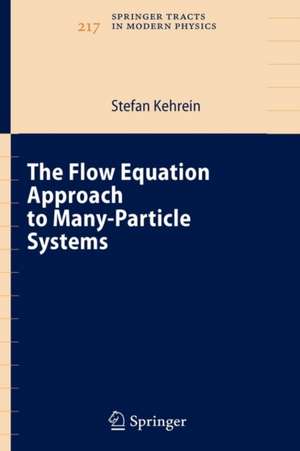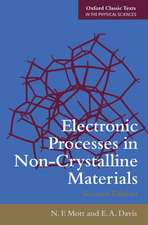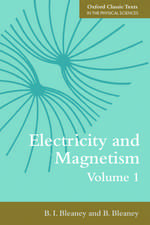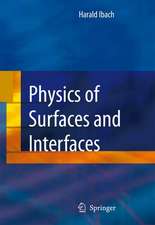The Flow Equation Approach to Many-Particle Systems: Springer Tracts in Modern Physics, cartea 217
Autor Stefan Kehreinen Limba Engleză Hardback – 7 iul 2006
| Toate formatele și edițiile | Preț | Express |
|---|---|---|
| Paperback (1) | 939.33 lei 6-8 săpt. | |
| Springer Berlin, Heidelberg – 22 noi 2010 | 939.33 lei 6-8 săpt. | |
| Hardback (1) | 945.30 lei 6-8 săpt. | |
| Springer Berlin, Heidelberg – 7 iul 2006 | 945.30 lei 6-8 săpt. |
Din seria Springer Tracts in Modern Physics
- 15%
 Preț: 648.42 lei
Preț: 648.42 lei - 18%
 Preț: 887.38 lei
Preț: 887.38 lei - 18%
 Preț: 1127.60 lei
Preț: 1127.60 lei - 20%
 Preț: 814.70 lei
Preț: 814.70 lei - 20%
 Preț: 816.04 lei
Preț: 816.04 lei - 18%
 Preț: 1424.83 lei
Preț: 1424.83 lei - 18%
 Preț: 785.55 lei
Preț: 785.55 lei -
 Preț: 409.63 lei
Preț: 409.63 lei -
 Preț: 428.30 lei
Preț: 428.30 lei -
 Preț: 426.34 lei
Preț: 426.34 lei -
 Preț: 387.38 lei
Preț: 387.38 lei -
 Preț: 387.20 lei
Preț: 387.20 lei -
 Preț: 381.21 lei
Preț: 381.21 lei -
 Preț: 378.71 lei
Preț: 378.71 lei -
 Preț: 382.95 lei
Preț: 382.95 lei -
 Preț: 384.48 lei
Preț: 384.48 lei -
 Preț: 382.36 lei
Preț: 382.36 lei -
 Preț: 387.38 lei
Preț: 387.38 lei -
 Preț: 391.40 lei
Preț: 391.40 lei -
 Preț: 380.63 lei
Preț: 380.63 lei -
 Preț: 386.00 lei
Preț: 386.00 lei - 18%
 Preț: 884.07 lei
Preț: 884.07 lei -
 Preț: 386.00 lei
Preț: 386.00 lei -
 Preț: 385.25 lei
Preț: 385.25 lei -
 Preț: 383.71 lei
Preț: 383.71 lei -
 Preț: 377.95 lei
Preț: 377.95 lei -
 Preț: 377.18 lei
Preț: 377.18 lei -
 Preț: 377.95 lei
Preț: 377.95 lei -
 Preț: 384.70 lei
Preț: 384.70 lei -
 Preț: 381.98 lei
Preț: 381.98 lei -
 Preț: 391.61 lei
Preț: 391.61 lei -
 Preț: 379.68 lei
Preț: 379.68 lei -
 Preț: 384.70 lei
Preț: 384.70 lei -
 Preț: 391.40 lei
Preț: 391.40 lei -
 Preț: 378.92 lei
Preț: 378.92 lei -
 Preț: 380.25 lei
Preț: 380.25 lei -
 Preț: 377.35 lei
Preț: 377.35 lei -
 Preț: 382.57 lei
Preț: 382.57 lei -
 Preț: 384.31 lei
Preț: 384.31 lei -
 Preț: 381.21 lei
Preț: 381.21 lei -
 Preț: 387.96 lei
Preț: 387.96 lei -
 Preț: 381.43 lei
Preț: 381.43 lei -
 Preț: 384.48 lei
Preț: 384.48 lei -
 Preț: 386.22 lei
Preț: 386.22 lei - 18%
 Preț: 1224.99 lei
Preț: 1224.99 lei
Preț: 945.30 lei
Preț vechi: 1152.81 lei
-18% Nou
Puncte Express: 1418
Preț estimativ în valută:
180.89€ • 193.43$ • 150.82£
180.89€ • 193.43$ • 150.82£
Carte tipărită la comandă
Livrare economică 18 aprilie-02 mai
Preluare comenzi: 021 569.72.76
Specificații
ISBN-13: 9783540340676
ISBN-10: 354034067X
Pagini: 170
Ilustrații: XII, 172 p.
Dimensiuni: 155 x 235 x 17 mm
Greutate: 0.44 kg
Ediția:2006
Editura: Springer Berlin, Heidelberg
Colecția Springer
Seria Springer Tracts in Modern Physics
Locul publicării:Berlin, Heidelberg, Germany
ISBN-10: 354034067X
Pagini: 170
Ilustrații: XII, 172 p.
Dimensiuni: 155 x 235 x 17 mm
Greutate: 0.44 kg
Ediția:2006
Editura: Springer Berlin, Heidelberg
Colecția Springer
Seria Springer Tracts in Modern Physics
Locul publicării:Berlin, Heidelberg, Germany
Public țintă
ResearchCuprins
Transformation of the Hamiltonian.- Evaluation of Observables.- Interacting Many-Body Systems.- Modern Developments.
Recenzii
From the reviews:
“The book exposes the flow equation approach to many-particle systems … . The book is well written, in a pedagogical manner. It works out in detail exactly solvable models, like the potential scattering and the resonant level models, to develop the ideas and concepts, and then proceeds to their application to those nontrivial problems, making comparisons to other approaches and pointing out the advantages of this method. It contains many up-to-date references. The book can be used in a graduate course on many-particle systems.” (Vitor R. Vieira, Mathematical Reviews, Issue 2012 d)
“The book exposes the flow equation approach to many-particle systems … . The book is well written, in a pedagogical manner. It works out in detail exactly solvable models, like the potential scattering and the resonant level models, to develop the ideas and concepts, and then proceeds to their application to those nontrivial problems, making comparisons to other approaches and pointing out the advantages of this method. It contains many up-to-date references. The book can be used in a graduate course on many-particle systems.” (Vitor R. Vieira, Mathematical Reviews, Issue 2012 d)
Textul de pe ultima copertă
This self-contained monograph addresses the flow equation approach to many-particle systems. The flow equation approach consists of a sequence of infinitesimal unitary transformations and is conceptually similar to renormalization and scaling methods. Flow equations provide a framework for analyzing Hamiltonian systems where these conventional many-body techniques fail. The text first discusses the general ideas and concepts of the flow equation method. In a second part these concepts are illustrated with various applications in condensed matter theory including strong-coupling problems and non-equilibrium systems. The monograph is accessible to readers familiar with graduate- level solid-state theory.
Caracteristici
Up-to-date review















